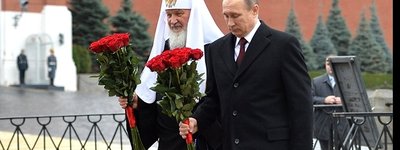Orthodoxy after Crexit
…the Council, for all its flaws, has shown that the Orthodox communion can function without Moscow and her satellites. The good news for Ukraine is that “Orthodoxy without Moscow” can undertake a sober and serious consideration of Ukraine’s bid for unity and autocephaly.
On June 13, about ten days before Britain decided to exit the European Union, the Russian Orthodox Church (Moscow Patriarchate) declared that if the Pan-Orthodox Council, scheduled to take place on the 19th-27th of that month on the island of Crete, were not postponed, the Russian Church would join the Antiochian, Bulgarian, and Georgian Churches in withdrawing from the meeting. Like Brexit, this “Crexit” evoked dismay and dire predictions. But the future of Orthodoxy, like that of Europe, may not be so dark.
For Ukrainian Orthodoxy, the absence of Russian representatives at the Council seemed a blessing. After all, in mid-June Ukraine’s parliament petitioned Ecumenical Patriarch Bartholomew to take steps towards the unification of the Ukrainian Orthodox Churches, to nullify the 1686 annexation of the Kyivan Metropolitanate by the Muscovite Church, and to grant the Ukrainians autocephaly. Naturally, a delegation of the Patriarch of Moscow would oppose such moves, except, perhaps, on its own terms.
Not surprisingly, however, the Pan-Orthodox Council did not take up the issue of Ukraine. It had a different agenda, which it reportedly did not adequately complete. All the same, a discussion had begun in the Orthodox world about the two major issues of Ukrainian Orthodoxy, which of course are related: unification and autocephaly. How should the three Ukrainian Orthodox Churches come together? What role, if any, should the Ecumenical Patriarchate play in this? To which of these Churches should it grant autocephaly? Or should it grant autocephaly only after they unite? Would a united Ukrainian Orthodox Church receive autocephaly as a patriarchate or as an archbishopric?
The fact that a serious discussion on these issues has begun is an encouraging sign. Moreover, Moscow’s self-isolation is not fatal to this project. On the contrary, the Council, for all its flaws, has shown that the Orthodox communion can function without Moscow and her satellites. The good news for Ukraine is that “Orthodoxy without Moscow” can undertake a sober and serious consideration of Ukraine’s bid for unity and autocephaly.
As with Brexit, the departure of one member can spark a salutary reform of the rest. Political analyst Andreas Umland wrote on June 27, “After the unexpected Brexit vote, the European project is becoming a massively political and salient issue again. If the EU—with or without the UK as a full member—rethinks and reconstitutes itself as a more democratic Union, that may benefit Ukraine.” (“What Brexit Means for Ukraine”, The New Atlanticist, 27 June 2016.)The same is true of post-Crexit Orthodoxy. If the Orthodox world – with or without the Moscow Patriarchate as a full participant – rethinks and reconstitutes itself as a more spiritual and less political communion, that may benefit Ukraine. And not only Ukraine. It would benefit Orthodoxy worldwide, and help it to fulfill its part in the re-evangelization of Europe and the evangelization of the lands beyond.










